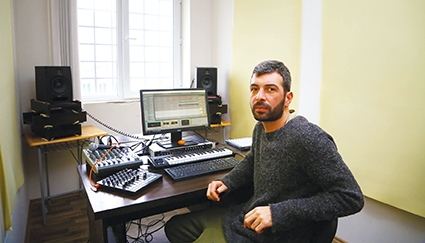Georgian Techno Artist Releases EP from Prison
Georgian techno artists Irakli and Michailo have created an EP made partly from their cell in a Tbilisi prison.
Confined within the walls of Tbilisi Ministry of Corrections’, behind walls lined with barbed wire and guards carrying machine guns, Michailo’s studio is makeshift. His wife sold his car to buy DJ equipment, including an old desktop PC, controller and small synthesizers. He also has a few Georgian folk instruments which he sometimes samples in his music.
Michailo has been in prison since 2013 after he was found guilty for possession of the drug MDMA and sentenced to nine years in prison. Two years into his jail time, he was granted permission to work on music.
Before being imprisoned, Michailo worked as a DJ and party promoter. “When I came here and realized that I couldn’t DJ, I thought, ok, I can’t live without music,” Michailo told Electronic Beats who interviewed him from his cell. “Once I figured out how to produce while in jail, it became the only way to make me happy. When I write music, it’s like I’m not here.”
Since being in prison, he has written scores for a variety of prison-produced plays which are performed by Ministry of Corrections’ inmates, and has also collaborated with other prisoners to reinterprate traditional Georgian folk music.
He began working on an EP with Irakli, a popular Georgian techno artist, after Irakli visited him in prison before a gig at Bassiani. The pair worked on the EP, titled Release, for a year. Irakli would send files to Michailo’s wife who would then take them to him in jail where he would work on producing.
The EP showcases four deep techno tracks that will be released on the label Intergalactic Research Institute for Sound.
However, the EP is about more than just the music. It is intended to challenge the government on its archaic drug laws that do not differentiate between personal use and dealing and give a voice to many others like Michailo who are imprisoned.
Since 2006, Georgia has had a zero-tolerance policy towards drug use. Drug offenses carry a sentence of eight to twenty years, which is higher than sentences for rape (four years) and terrorism (6 years).
Those who test positive for traces of drugs are criminalized and marginalized, often slipping through the cracks of society with little help or rehabilitation.
The Release EP combines music, with the stories of people who have experienced Georgia’s strict drug laws, serves as an open letter to the government.
“Sadly for the past six years, I have only talked to my little girl on the phone,” reads part of Michailo’s letter. “She thinks I live very far away in the USA because we did not want to hurt her at such a young age with the truth.”
In some ways, Michailo is lucky compared to the estimated 3,000 prisoners sitting in jail for possession of small amounts of drugs. Through his music, he has found a release.
By Amy Jones
Image source - Electronic Beats











